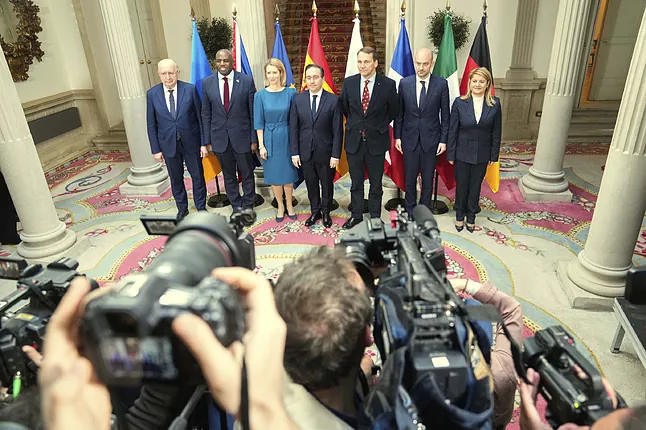Madrid hosted on Monday the G5+ meeting, a ministerial meeting on European and Ukrainian security in which the main countries of the Old Continent participate. It is a contact group formed by Germany, France, Italy, Poland, Spain,the United Kingdom and Ukraine, with the participation of the High Representative of the European Union for Foreign Affairs, Kaja Kallas, who have held four meetings since last November.
The meeting took place on Monday at the Viana Palace, the residence of the Spanish Minister of Foreign Affairs, José Manuel Albares, who also served as the host of a meeting where ending the war in Ukraine has been the focus of all initial interventions and the core of the final statement.
The participating countries have pledged to reinforce Ukraine "with significant military support in the short and long term, as well as within the Capabilities Coalitions and the Contact Group for the Defense of Ukraine, which will hold its next meeting on April 11."
"We are also willing to exert more pressure on Russia using all available instruments, including the adoption of new sanctions, with the aim of hindering its ability to wage its war of aggression," they have agreed.
With the representatives of Germany and Ukraine connected remotely and the absence of the Italian Antonio Tajani, who sent his Secretary of State for Foreign Affairs, the British David Lammy has been one of the most outspoken.
"We need Putin to accept an unconditional ceasefire now," he said in the pre-meeting intervention. Lammy has emphasized that the United Kingdom is committed to investing 2.5% of Defense spending by 2027, and in the next term, they will reach 3%. "It is a very important moment to discuss with our European colleagues," he insisted.
Diplomatic sources have informed EL MUNDO that during the meeting, Lammy will make it clear that to prevent future wars, we all must spend more on Defense. "Collective action can deter our adversaries and protect the necessary conditions for prosperity within our countries, but only if we all take responsibility," the sources explained.
Of the countries that participated in this meeting, in addition to Poland, whose Defense investment exceeds 4%, France and the United Kingdom exceed the minimum 2% set at the NATO Summit in 2014. Additionally, in Germany, two weeks ago, the Parliament reached a State pact to exempt the increase in Defense investment from federal spending rules. Currently, they invest 1.52%
Italy, led by Giorgia Meloni, who is one of Donald Trump's preferred partners and has been more adamant in refusing to send troops to Ukraine, invests an additional 0.8%, totaling 1.6% of its GDP in Defense.
The Polish Minister of Foreign Affairs, Radoslaw Sikorski, has pointed out that "a lot of time has passed" since the meeting where the minimum investment of 2% was set, but he also acknowledged: "It is a fact that the closer you are to Russia, the more you spend on Defense."
The diplomat expressed his pride that "European countries realize that Putin's aggressive intentions affect all of Europe," stating that "in Spain, there is misinformation and political manipulation," while warning that his country suffers from "aggressive propaganda" and "espionage" by Russian forces.
The Spanish Minister, José Manuel Albares, took the opportunity in his previous intervention to express Spain's position on using frozen Russian funds for the reconstruction of Ukraine. "It can be an advance for those war reparations and certainly in the current debate within the European Union on how to help Ukraine predictably and consistently and how to finance it, once the interests are there, it is more than legitimate to have it, and that is Spain's position," he said.
This contact group aims to continue its meetings with the established frequency since the first meeting on November 19 in Warsaw. They met again in Berlin on December 12 and on February 12 in Paris. On this occasion, not all ministers were present, two followed remotely, and Italy sent its Secretary of State.
